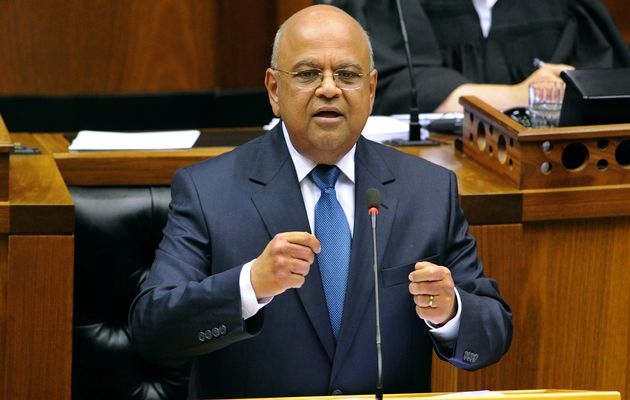This is the full Budget for 2016 as delivered by Finance Minister Pravin Gordhan on Wednesday, 24th February 2016.
Honourable Speaker Mister President
Mr Deputy President
Cabinet Colleagues and Deputy Ministers Governor of the Reserve Bank
MECs of Finance Fellow South Africans
I have the honour to present the 2016 Budget of President Zuma’s second administration.
We do so in a spirit of frankness, both about our challenges and the opportunity to turn our economy’s direction towards hope, confidence and a better future for all.
Low growth, high unemployment, extreme inequality and hurtful fractures in our society – these are unacceptable to all of us.
I have a simple message. We are strong enough, resilient enough and creative enough to manage and overcome our economic challenges.
All of us want jobs, thriving businesses, engaged professionals, narrowing inequality, fewer in poverty.
All of us want a new values paradigm, a society at peace with itself, a nation energised by the task of building stronger foundations for our future society and economy.
We want our government to function effectively, our people to work in dignity, with resources for their families, decent homes and opportunities for their children.
We want to see progress throughout our land, in agriculture, manufacturing, mining, construction, tourism, science and research, sport and leisure, trade and commerce.
It is within our grasp to achieve this future.
It requires bold and constructive leadership in all sectors, a shared vision, a common purpose, and the will to find common ground. Above all we need action, not just words.
Let us unite as a team, sharing our skills and resources, building social solidarity, defending the institutions of our democracy and developing our economy inclusively.
We do have a plan, to:
• Manage our finances in a prudent and sustainable way,
• Re-ignite confidence and mobilise the resources of all social partners,
• Collectively invest more in infrastructure to increase potential growth,
• Give hope to our youth through training and economic opportunities,
• Protect South Africans from the effects of the drought,
• Continuously improve our education and health systems,
• Accelerate transformation towards an inclusive economy and participation by all,
• Strengthen social solidarity and extend our social safety net.
The Budget rests on the idea of an inclusive social contract, encompassing an equitable burden of tax and a progressive programme of expenditures.
The Budget relies on institutions of good governance and a public ethic that values honesty and fairness.
If we act together, on these principles, as public representatives, civil servants, business people, youth, workers and citizens, we can overcome the challenges of tough economic times and difficult adjustments.
In acting together we can address declining confidence and the retreat of capital, and we can combat emerging patterns of predatory behaviour and corruption.
We are conscious of the difficulties we face. Our resilience as a nation, black and white, can propel us to a better future if we make the right choices.
Honourable Speaker, I hereby table before the House:
• The 2016 Budget Speech,
• The 2016 Budget Review, including
o The fiscal framework,
o The revenue proposals, customs and excise duties and estimates of national revenue, and
o Our responses to the Budgetary Review and Recommendation Reports,
• The Division of Revenue Bill,
• The Appropriation Bill, and
• The Estimates of National Expenditure.
In addition, I am introducing the Revenue Laws Amendment Bill 2016 to adjust certain provisions regarding to retirement funds, and related matters.
These are our budget proposals, and I look forward to further engagement through the Parliamentary budget process.
Overview of the Budget
Honourable Speaker, the past year has seen a deterioration in the global economy.
In our own region, weaker business confidence coincides with a severe drought, bringing with it rising prices and threats to water supply in many areas.
In addition we are obliged to confront the impact of slow growth on our public finances, while continuing to respond to the expectations of citizens and communities for improved education, reliable local services and responsive public administration.
The combination of multiple demands and constrained resources at times seems overwhelming. How does the state deal with such complexity? What should we prioritise?
As in the past, we have sought advice from citizens. This year, I sought budget pointers on several specific things: What does government do well? What should we stop doing? How can we achieve inclusive growth?
• On what we do well, South Africans have very clear views: Tax administration. And paying social grants.
• What we should stop doing: Corruption and waste. Bailing out state entities.
• How to support inclusive growth: Support for small business. Job opportunities targeting the youth.
I greatly appreciate the response from so many South Africans – over 1500 in all. Mr Faiek Sonday, and Ms Thuli Ngubane are with us today. Mr Sonday’s advice was that “we should build more roads and train routes, because the sooner you get a worker at the desk or machine the more productive the economy will be”. And Ms Ngubane expressed the views of so many tipsters: “Let our schools’ infrastructure be improved so that all schools are conducive to learning. This will ensure that we produce the quality of students that can take our country forward.”
We agree, and indeed these are central priorities of the National Development Plan.
As points of departure for the 2016 Budget, Honourable Speaker, allow me to emphasise several broad principles that flow through our NDP:
• It is a programme for inclusive growth – our social programmes, industrial action plan, promotion of agriculture and rural development, skills and training initiatives, investment in housing and municipal services are aimed at both prosperity and equity, creating opportunities for all and broadening economic participation.
• It is a plan for a strong mixed economy – in which public services and state actions complement private investment, expansion of trade and social enterprise.
• It recognises that improvements in the quality of education are the foundations of broad-based growth, productivity improvement and sustainable growth.
• It acknowledges that investment in infrastructure has to be enhanced and sustained both to underpin economic growth and address the spatial inefficiency and fragmentation of the apartheid landscape.
• It emphasises that employment creation has to be accelerated if growth is to be inclusive, and that income security for all relies also on appropriate social security, health services and social development programmes.
• It prioritises building the capability of the state, and strong leadership throughout society, to drive development and promote social cohesion.
• It highlights that partnership between government, business, organised labour and civil society is the key to policy coherence and more rapid development.
The Budget tabled today is guided by the NDP. It is a budget for inclusive growth, it emphasises partnerships amongst role players in our economy, it prioritises education and infrastructure investment, it supports employment creation and it contributes to building a capable, developmental state.
In brief, we propose the following:
• Against the background of slow growth, rising debt and higher interest rates, the pace of fiscal consolidation will be accelerated. The budget deficit will be reduced to 2.4% by 2018/19.
• The expenditure ceiling is cut over the next three years by R25bn, mainly by curtailing personnel spending.
• Tax increases amounting to R18bn in 2016/17 are proposed, and a further R15bn a year in 2017/18 and 2018/19.
• An additional R16bn is allocated to higher education over the next three years, funded through reprioritisation of expenditure plans.
• Taking into account projected increases in the cost of living, R11.5bn is added to social grant allocations over the next three years.
• Funds have been reprioritised to respond to the impact of the drought on the farming sector and water-stressed communities.
In support of growth and development, Honourable Speaker, our initiatives are also aimed at enabling and mobilising private sector and civil society capacity.
• Building on the success of our Renewable Energy initiatives, the Independent Power Producers Programme will be extended to include coal and gas power projects over the period ahead.
• Measures to strengthen tourism, agriculture and agro-processing are in progress.
• Collaboration with regional partner countries is being stepped up to improve border management, streamline trade flows and invest in transport and communications corridors.
• Investment in our cities is being accelerated, creating opportunities for participation of developers and other partners in housing, infrastructure and commercial development.
• Regulatory challenges that affect mining investment and employment are being addressed.
• A pathbreaking study of the cost of doing business has been completed, and municipalities are working on identified reforms.
• Progress has been made towards a minimum wage framework, and to reduce workplace conflict.
• The National Health Insurance White Paper has been published, and proposals for comprehensive social security will be released by mid-year.
Engagement with social partners needs to be intensified. Project plans and investments need to be managed and implemented.
But I know you will join me in acknowledging that the real champions of our development are the activists and entrepreneurs, officials and facilitators, who get on with the job, day by day, of managing programmes and running businesses, serving communities and meeting needs.
Our faith communities, non-governmental organisations and community volunteers all demonstrate daily that basic needs can be met with dignity. Initiatives like “Operation Hydrate” and “Gift of the Givers” have led the way in responding to the impact of the drought.
The Gauteng Province’s Ntirhisano outreach programme similarly emphasises that communities can be co-partners with government in accelerating service delivery. We can strengthen these efforts as government, business, religious and community organisations, by working together.
Global outlook
Honourable Members, South Africa’s economic prospects are intertwined with global economic developments. A period of unprecedented monetary stimulus in response to the 2008 recession is not yet over, and global volatility and structural imbalances are far from resolved.
The pace of economic growth has slowed in many countries. The price of oil has fallen by 50 per cent since December 2014.
Our major exports – platinum, gold, iron ore and coal – have seen substantial declines in global demand and in prices. The effects on our economy are widespread:
• lower export earnings,
• lower revenue,
• declining investment,
• job losses, and in some cases business failures.
For the world as a whole, growth declined from 3.4%in 2014 to an estimated 3.1% last year. In sub-Saharan Africa, the decline was from 5% to 3½%. A moderate recovery is expected over the next two years.
It is notable that faster growth is being achieved in countries which have undertaken bold structural reforms, such as India’s scaling back of subsidies for industry and opening up of trade opportunities, and the promotion of skilled immigration, urban investment and labour-intensive manufacturing and agro-processing in South-east Asian and several African economies. These efforts have helped boost investor sentiment and reduce economic vulnerabilities.
Our own structural challenges and reforms are articulated in the National Development Plan. Our economic recovery depends on our ability to convert the plan into actions that deliver on the promise for a better life for all.
South African economic outlook
Fellow South Africans, growth rates of below 1% fall short of what we need to create employment and reduce poverty and inequality. The Treasury currently expects growth in the South African economy to be just 0.9% this year, after
1.3% in 2015. This reflects both depressed global conditions and the impact of the drought.
It also reflects policy uncertainty, the effect of protracted labour disputes on business confidence, electricity supply constraints and regulatory barriers to investment.
However, the institutional foundations of our economy remain resilient:
• Macroeconomic policy is effective,
• The inflation targeting framework provides an anchor for price and wage setting,
• Our banks and financial institutions are well-capitalised, and we have liquid rand-denominated debt markets,
• The architecture of our Constitution, justice system, public and private law and dispute resolution mechanisms is robust,
• We have excellent universities and research centres,
• We have a strong private sector,
• We are a resourceful people, committed to contributing to a better South Africa.
Mr Raymond Wesley wrote to me as follows: “As South Africans, we don’t have an appreciation of the strides we’ve made. Minister, show South Africans, especially the rich, that people’s lives have changed for the better.”
This is true, yet there is more to be done.
We are resilient, we are committed, we are resourceful. We know how to turn adversity into opportunity.
In the numbers, Honourable Speaker, there are indicators that an economic turnaround is possible if we build confidence and make the right choices.
• Business services, tourism and communication services continued to expand over the past year, contributing positively to job creation.
• While overall agricultural output has declined under severe drought conditions, there has been strong growth in several export products: including nuts and berries, grapes and both deciduous and citrus fruits.
• Overall export growth by volume was over 9% last year, and will continue to benefit from the competitiveness of the rand. South African exports to the rest of Africa now exceed R300bn a year, up from about R230bn just three years ago.
• Retail trade data for the last quarter of 2015 indicate growth of over 4% in real terms, signalling that consumer spending remains buoyant despite declining confidence.
• Investments amounting to over R20bn have recently been announced in the automotive sector.
Yet our economy is not growing fast enough to raise employment or improve average incomes, Honourable Speaker. Investment growth must be substantially scaled up.
Growth and development
So we are resolved to restore the momentum of growth, to ensure that it is inclusive and sustainable, and to preserve our economy’s investment-grade status.
As Minister Nene put it in his October Medium Term Budget Policy Statement address: “If we do not achieve growth, revenue will not increase. If revenue does not increase, expenditure cannot be expanded.”
This means we must address institutional and regulatory barriers to business investment and growth. It means we must give greater impetus to sectors and industries where we have competitive advantages. And it means being bold where there is need for structural change, innovation and doing things differently. We need agility and urgency in implementation.
International experience has demonstrated that growth is ignited by strong and stable political and economic institutions, sound infrastructure that reduces the cost of doing business and facilitates trade, competition between firms and openness to trade and an environment where firms invest and undertake research and development. We also know that the more inclusive the economy the greater its scope for growth.
These are the challenges we hear in South Africa today.
• We are responding to appeals from the business sector for greater certainty in respect of policies that affect investment decisions.
• We are engaging with proposals from organised labour for a minimum wage policy, and for progress on opportunities for young people.
• We are responding to action in communities where services are missing or badly managed.
• We are crafting solutions to the voices of students regarding fees and housing.
I need to emphasise that violent protest is not an acceptable way of articulating these challenges.
Also, in these and other areas, the choices we make cannot meet every need, and the action we require involves collective action by many stakeholders. Today’s Budget sets out government’s plans for the next three years, building on what we have achieved since 1994. It also signals the actions underway to improve policy coordination and collaboration between social partners and stakeholders.
As outlined by the President, initiatives are in progress to address our policy coordination and implementation challenges.
• Over 80 bills and plans have been reviewed since September last year as part of the new socio-economic impact assessment programme, under Minister Radebe’s oversight. The aim is to address possible regulatory constraints pro-actively before they take effect.
• Visa regulations have been revised following consultation between Ministers Gigaba and Hanekom and concerns raised by the tourism industry.
• Talks are in progress under Minister Olifant’s leadership to improve workplace dispute resolution procedures.
• Minister Davies is introducing a new investment promotion agency to streamline administrative procedures and enhance our position as an African financial centre.
• Special economic zones and employment-intensive sectors with export potential have been prioritised for support by the Industrial Development Corporation.
• Initiatives to transform ownership of land and improve productivity in agriculture are under way, and Ministers Zokwana and Nkwinti are addressing drought-related challenges in rural areas.
• Under Minister Molewa’s guidance, South Africa’s response to the global climate change challenge has been prepared, and work with the National Business Initiative on the green economy has been strengthened.
• Our environmental employment programmes continue to earn international recognition. The Community Work Programme is expanding its reach and Jobs Fund partnership projects of R12bn have been approved.
• Building on the Phakisa oceans economy initiative, a R9bn investment in rig repair and maintenance facilities at Saldanha Bay is planned, and work has begun on a new gas terminal and oil and ship repair facilities at Durban.
• Minister Joemat-Pettersson is overseeing our renewable energy, coal and gas IPP programme, and preparatory work for investment in nuclear power.
• Minister Pandor’s department is leading work on beneficiation initiatives, including titanium, fuel cells, fluorochemicals and composite materials.
• Minister Motshekga is working with social partners on the National Education Collaboration Trust to identify and implement school improvement initiatives.
In recent weeks, President Zuma, other Ministers and I have engaged with business leaders to understand their concerns and views. Confidence and shared understanding have been reinforced. These engagements are clearly critical to boosting our economy, and must be extended to include regional forums and other stakeholders.
We particularly welcome the working groups that have been established and several practical proposals for joint action. These include a collaborative initiative to combat corruption and abuse of tender procedures, a new fund to accelerate small and medium enterprise development and measures to build investor confidence and contribute to social cohesion.
By removing constraints, supporting innovation, protecting jobs, diversifying our economy and exploring new opportunities, we can expand growth prospects.
Our economic outlook is not what it should be, global uncertainty and the drought are very real challenges, but our efforts to build a better future continue.
We are resilient, we are committed, we are resourceful.
By working together we can increase growth, broaden participation and inspire confidence in our economy and society.
Investment and sustainable growth
Honourable Members, the economist Dani Rodrik has recently noted that in those countries that are still growing rapidly, despite global economic headwinds, public investment is doing much of the work. To finance the investment needed for sustainable growth, we have the institutional capacity to blend international and domestic savings, and to combine public and private sector financing to mitigate risk and reduce the cost of capital.
The Presidential Infrastructure Coordinating Commission, under Ministers Nkwinti and Patel, has brought greater coherence to our strategic investment plans. They
have drawn attention to the need for multi-year appropriations for major capital projects. Reform in this regard is under consideration.
• Energy investment amounts to R70bn this year and will be over R180bn over the next three years, as construction of the Medupi, Kusile and Ingula power plants is completed.
• Transport and logistics infrastructure accounts for nearly R292bn over the next three years under Minister Peters’ oversight. Transnet is acquiring 232 diesel locomotives for its general freight business and 100 locomotives for its coal lines. There is R3.7bn to upgrade the Moloto Road, R30bn for provincial roads maintenance, R18bn for bus rapid transit projects in cities and refurbishment of over 1 700 Metrorail and Shosholoza Meyl coaches.
• R62bn is allocated for the housing subsidy programmes of Minister Sisulu’s department, and R34bn for bulk infrastructure and residential services in metropolitan municipalities.
• R28bn will be spent over the MTEF on improving health facilities and R54bn on education infrastructure.
• Under Minister Mokonyane’s leadership, the next phase of the Olifants River water scheme is in progress, completion of the supply to Lukhanji Municipality in the Eastern Cape, completion of the Wolmaransstad wastewater treatment works and construction of the Polihali Dam as part of the Lesotho Highlands project.
These are some components of the R870 billion public sector infrastructure programme over the next three years.
But our growth and development depends also on an expanding envelope of enterprise investment in industry, mining and mineral beneficiation, agriculture and agro-processing, housing, commercial development and tourism facilities. There are also initiatives in progress to reinforce financing of these projects.
• The Industrial Development Corporation continues to play a leading role in financing manufacturing and beneficiation. It plans to invest R100bn over the next five years, including R23bn set aside to support black industrialists.
• We have completed a R7.9bn capital transfer to the Development Bank of Southern Africa, approved in 2013, which enables it to expand lending and implementation support to municipalities, and to complement private sector funding of strategic infrastructure projects. The Bank aims to increase lending by R48bn over the next three years. Initiatives to reinforce municipal implementation capacity have been prioritised.
• The Land Bank has set aside a concessionary loan facility to assist farmers in recovering from the impact of the current drought conditions. Over the next three years R15 billion is allocated for land acquisition, farm improvements and expanding agro-processing opportunities.
• I am also pleased to confirm that the New Development Bank will open its Africa Regional Centre in Johannesburg next month. Our first instalment of R2 billion was paid in December last year, and the Budget makes provision for our further commitments over the medium term. This initiative gives impetus to our role as a financial centre for Africa, and will facilitate access to global finance by African investors and institutions.
So the capacity to mobilise finance is in place. Amendments to bank regulations are proposed, furthermore, which will facilitate lending for long-term infrastructure investment.
In energy, transport, telecommunication and urban development, there are many opportunities for joint public and private investment and facilities management.
Corporate investment and participation by trade union funds in infrastructure development needs appropriate policies and market structure frameworks, clarifying the roles and linkages between public and private sector service providers. Progress in these regulatory arrangements is the key to more rapid investment and more inclusive growth in these sectors.
Our working partnership with business leaders and social stakeholders, under President Zuma’s initiative, is about implementing these and other aspects of the National Development Plan.
Fiscal consolidation
This year’s Budget, Honourable Speaker, is focused on fiscal consolidation. We cannot spend money we do not have. We cannot borrow beyond our ability to repay. Until we can ignite growth and generate more revenue, we have to be tough on ourselves.
A central objective is to stabilise debt as a percentage of GDP. To achieve this, the new budget framework sets deficit targets for the next three years which are lower than the October Medium Term Budget Policy Statement projections. Spending plans are reduced, a higher revenue target is set and net national debt is projected to stabilise at 46.2 per cent of GDP in 2017/18, and to decline after that.
These budget proposals signal government’s commitment to a prudent, sustainable fiscal policy trajectory, and respond directly to the changed circumstances since the 2015 MTBPS was tabled.
Honourable Members, we have had to take into account the slowdown in revenue associated with slower economic growth over the past year. In last year’s Budget we projected total tax revenue of R1 081 billion. The revised estimate is R11.6 billion short of this total, but nonetheless about 8.5 per cent more than the 2014/15 outcome. This is a most commendable effort in the circumstances: all South Africans have contributed, and the 14 000 staff of the Revenue Service have done a sterling job.
A consolidated revenue target of R1 324 billion is set for 2016/17, or 30.2 per cent of GDP. Expenditure will be R1 463 billion, leaving a budget deficit of R139 billion, or 3.2 per cent of GDP. The deficit will decline to 2.4 per cent in 2018/19.
Details of the proposed adjustments are set out in the Budget Review. I have highlighted key spending priorities already. I need to emphasise that additional spending on higher education, small business development, and amounts set aside for responding to the drought and other contingencies, are accommodated through stringent cost containment measures across all departments.
These include:
• Restrictions on filling managerial and administrative vacancies, subject to review of human resource plans and elimination of unnecessary positions;
• Reduced transfers for operating budgets of public entities;
• Capital budgeting reforms to align plans with budget allocations while strengthening maintenance procedures;
• Mandatory use of the new e-tender portal, thereby enforcing procurement transparency and accessible reference prices for a wide range of goods and services;
• A national travel and accommodation policy and instructions on conference costs;
• New guidelines to limit the value of vehicle purchases for political office- bearers;
• Renegotiation of government leasing contracts;
• New centrally negotiated contracts for banking services, ICT infrastructure and services, health technology, school building and learner support materials.
Initiatives of the Chief Procurement Officer will be extended to include monitoring of state-owned companies’ procurement plans and supply chain processes, and reviews of contracts above R10 million to ensure value for money. Centrally negotiated contracts will be mandatory with effect from April 2016.
As Ms Nobuntu Mbelle advised me: “Minister, government should also tighten its belt.”
The OCPO’s mandate is to achieve savings of R25 billion a year by the third year of the current MTEF period, out of a government procurement budget of about R500 billion a year. Our reform proposals draw on a consultation programme last year that reached over 7 000 suppliers and 2 500 supply chain practitioners, and attracted over 27 000 responses to a national survey.
It is clear that we can achieve considerable savings to government, while also ensuring that procurement processes are streamlined and service providers are paid on time.
I need to acknowledge the valued cooperation of Minister Ramatlhodi in addressing our personnel management challenges. Government procurement reforms also rely on collaboration with my colleagues and their respective departments: Minister Nxesi at Public Works, Minister Davies and Minister Zulu in respect of industrial participation, supplier development and black economic empowerment, and Minister Cwele on telecommunications and the rollout of broadband services, which is both an area of cost-saving in itself and an enabling condition for more efficient procurement systems and electronic communication.
In saying this, Members of the House, I want to draw attention to the broader opportunities that well-managed public administration reforms offer. Investments by telecommunication partners in fast internet connectivity for schools, clinics and government buildings brings down the costs, over time, for internet connectivity for neighbouring homes and businesses. When government office accommodation projects are well planned, they create opportunities for commercial and residential development in the surrounding precinct. And government as an employer contributes to training and organisational development across the wider economy. Inclusive growth is in part about these linkages between public and private sector development.
Tax proposals
Inclusivity is also an important principle in our tax system, Honourable Speaker.
South Africa has built one of the most effective tax authorities in the developing world. The Revenue Service has made huge strides over the past decade in enforcing the law while providing assistance to small businesses and individuals. Public compliance with tax obligations is high. I am deeply mindful that we have a corresponding obligation, as government, to improve the impact of every rand spent, and to eliminate waste and corruption.
Inclusivity is also about the details of tax design, how it supports or hinders small and growing businesses, how the burden of tax is shared across individuals and households in different circumstances and in different income brackets, and how taxes contribute to environmental and health objectives.
This year, in view of the need to raise additional revenue and reduce the budget deficit, we have paid special attention to the fairness and inclusivity of the tax system.
We have also been mindful of the need to moderate the impact of tax increases on households and firms in the present economic context.
Our tax proposals include the following:
• Personal income tax relief of R5.5 billion, which partially compensates for inflation, focused mainly on lower- and middle-income earners;
• An increase in the monthly medical tax credit allowances;
• An increase of 30 cents a litre in the general fuel levy;
• Introduction of a tyre levy to finance recycling programmes, increases in the incandescent globe tax, the plastic bag levy and the motor vehicle emissions tax;
• Introduction of a tax on sugar-sweetened beverages; and
• Increases of between 6 and 8.5 per cent in the duties on alcoholic beverages and tobacco products.
The Income Tax Act already contains measures to encourage provision of bursaries by employers to employees or their relatives. It is proposed that the income eligibility limits and qualifying bursary values should be increased. Inclusion of industry-based training organisations in the list of activities qualifying for tax-exemption is also under consideration.
Our current taxes on wealth are under review by the Davis Committee. Higher capital gains inclusion rates are proposed, together with an increase in the annual amount above which capital gains become taxable. The transfer duty rate on properties above R10 million will increase from 11 per cent to 13 per cent, and measures are proposed to strengthen the estate duty and donations tax.
We will continue to act aggressively against the evasion of tax through transfer pricing abuses, misuse of tax treaties and illegal money flows. Drawing on the work of the OECD, the G20 joint project on base erosion and profit shifting and independent bodies such as the Tax Justice Network, further measures will be taken to address such revenue losses, including inappropriate use of hybrid debt instruments.
With effect from 2017, international agreements on information sharing will enable tax authorities to act more effectively against illicit flows and abusive practices by multinational corporations and wealthy individuals. Building on the expertise gained by the Large Business Centre since its establishment in 2004, SARS is well placed to take advantage of the new Common Reporting System. Our international collaboration is an essential part of efforts to ensure that the tax system remains robust and contributes to inclusive growth. I will announce further steps in this regard later in the year.
Time is now running out for taxpayers who still have undisclosed assets abroad. With next year’s deadline in mind, additional relief will be offered for a period of six months, from October this year, to allow non-compliant taxpayers to regularise their affairs. Though not introduced today, we publish on our website the draft bill on the special voluntary disclosure programme and the rates and threshold bill.
Social security, health insurance and retirement reform
Alongside the impact of tax on take-home pay, Honourable Members, there are also contributions to pension and provident funds, group life arrangements and medical schemes. Not everyone makes these contributions, and so their benefits are not universally enjoyed.
Our policy commitment is to achieve universal health coverage, and comprehensive social security. These contribute to the broader framework for inclusive growth, decent work, income security and social protection that forms part of the National Development Plan.
These are not straightforward reforms. Health financing is complex, because the demands unavoidably exceed available funds. This is the case even in advanced rich countries. Retirement and social security reform is complex, because existing arrangements create long-term obligations, and the needs of today all too easily crowd out provision for tomorrow.
Yet we must confront these challenges.
Minister Motsoaledi has published the White Paper on National Health Insurance. He has rightly emphasised that public health service delivery improvements must be prioritised, and reform of the private health and medical scheme environment is needed. In order to take the White paper’s proposals forward, the Treasury will shortly release further details on financing aspects.
In taking the comprehensive social security agenda forward, we have to recognise that existing social security arrangements are fragmented, which raises costs and leaves several social needs unaddressed.
Minister Dlamini and I have a shared responsibility for the social security reform programme, which has to draw on both international good practice and interdepartmental work of recent years.
Tighter regulation of the retirement funding industry is part of this reform effort. The intention is to protect members’ interest and ensure that funds are not dissipated by unnecessary administration and financial costs, and that an income in retirement is assured. Our engagements with stakeholders will continue this year.
To support a greater national savings effort, we introduced Tax Free Savings Accounts last year. The response has been most gratifying – about 150 000 accounts have been opened, with savings totalling R1 billion. For those who have not yet taken this opportunity, you have until the end of this month to take advantage of this year’s R30 000 limit for special tax treatment in these accounts.
Let me assure public servants, again, that reform of the retirement system will not affect their accrued pension rights. Indeed, I am pleased to report that the investment portfolio of the Government Employees’ Pension Fund grew by 12.2 per cent to R1.6 trillion in the year to March 2015. GEPF pensioners will receive a 5.3 per cent increase in April this year.
The Revenue Laws Amendment Bill 2016 introduced today gives effect to the decision by Cabinet last week to postpone the annuitisation requirement for provident fund members for two years to allow for further consultation with key stakeholders. The tax benefits will continue to be implemented from 1 March 2016 for all retirement fund contributions, including for provident funds.
State-owned Entities
State-owned companies, Honourable Speaker, have important roles to play in boosting growth and development. But there are issues to address in their governance, mandates, financing and operations.
The recently-released report of the Presidential Review Commission on State-Owned Enterprises is a very welcome guide to the path ahead. It rightly emphasises that effective leadership is central to progress. It notes that our infrastructure financing requirements are huge, and require effective co-funding arrangements between SOCs and other investors.
The asset base of state owned entities is over R1 trillion, equivalent to about 27 per cent of GDP. They maintain networks and provide services – power, roads, transport, water, communications – on which the rest of the economy depends.
But the PRC report indicates that the mandates of some of our entities overlap, some operate in markets that should be more transparently competitive and some are no longer relevant to our development agenda. Some are in perpetual financial difficulties. So we must take decisive steps to ensure that they are effectively governed and that they contribute appropriately to the attainment of the National Development Plan.
Firstly, as President Zuma has indicated, entities that are no longer necessary should be phased out. The resources raised or saved will be redirected to the balance sheets of SOCs that should grow.
Secondly, where entities have overlapping mandates, rationalisation options will be pursued. The merger of our housing DFIs is already in progress. There are entities with regulatory responsibilities where capacity should be combined. We have national and provincial entities with diverse property holdings, interests in farming or trading or manufacturing enterprises – often inherited from the pre-1994 dispensation, typically buried in subsidiary companies that are not publicly accountable. These are unnecessary state investments, and often a drain on government resources. They are also assets with potential for growth in independent hands.
It seems clear, furthermore, that we do not need to be invested in four airline businesses. Minister Brown and I have agreed to explore the possible merger of SAA and SA Express, under a strengthened board, with a view to engaging with a potential minority equity partner, and to create a bigger and more operationally efficient airline.
Thirdly, the balance sheets of several entities with extensive infrastructure investment responsibilities are now stretched to their limits. Government has provided support in the form of guarantees, which now total R467 billion or 11.5 per cent of GDP. This is a source of pressure on the sovereign rating. Yet we need to accelerate infrastructure investment in the period ahead. So we must broaden the range and scope of our co-funding partnerships with private sector investors. This requires an appropriate framework to govern concession agreements and associated debt and equity instruments, and appropriate regulation of the market structure.
In taking this forward, we are able to draw on our experience in road funding concessions, in building the renewable energy market, and in promoting broadband telecommunications. Across these and other sectors we have much to learn from each other, both nationally and through provincial and local initiatives.
Minister Brown is in discussion with Transnet’s leadership on measures to accelerate private sector participation in the ports and freight rail sector. The intention is to improve efficiencies, reduce the cost of doing business and increase investment in new port facilities and inland terminals. This will complement investments that Transnet has already initiated through its Market Demand Strategy.
Our aim is to strengthen our state entities so that they can play a propulsive and dynamic role in our development. Further financial support to state-owned companies will depend on clarity of this mandate and firm resolution of governance challenges.
Our regulatory agencies have a special responsibility in this regard: in setting prices for electricity, transport and water utilities, they have to ensure that investment can continue to be financed and that costs are properly managed.
The strength of our major state-owned companies does not lie in protecting their dominant monopoly positions, but in their capacity to partner with business investors, industry, mining companies, property and logistics developers, both domestically and across global supply chains.
The 2016 Budget: Government’s Action Plan
Before concluding, Honourable Speaker, allow me to return to the main elements of the 2016 Budget, our spending plans and their contribution to growth and broadening development.
Our approach is to build on our strengths, directly address weaknesses and be bold where new initiatives are needed.
• The budget framework brings forward our fiscal consolidation, reducing the budget deficit to 2.4 per cent by 2018/19.
• Taxes are raised moderately, across a broad base, while limiting the impact on lower-income families.
• Personnel spending has been curtailed and cost containment measures are reinforced.
• Expenditure growth is focused on post-school education and training, economic infrastructure, social protection and health services.
Economic infrastructure
Budget allocations for water infrastructure this year take into account the special needs of drought-affected areas and the need to address water losses in critical supply networks.
The Regional Bulk Infrastructure Grant programme has been allocated R15 billion over the medium-term for the construction of the bulk water and sanitation infrastructure.
Public transport improvements in our cities are again prioritised, alongside better road maintenance and rehabilitation plans.
Over the MTEF period R1.6 billion is allocated to the SA Connect broadband programme to support access in remote areas and of schools, health care facilities and government institutions.
Business support and empowerment
Steps to reduce the regulatory burden for business investors are in progress. These include the establishment of Invest South Africa as a partnership with the private sector and concerted efforts by our largest cities to reduce the administrative costs of starting businesses.
A review of business incentives has been initiated, to strengthen their impact on growth, productivity, competitiveness, trade and competitiveness.
R475 million has been reprioritised to the Department of Small Business Development for assistance to small and medium enterprises and cooperatives.
Agriculture
Programmes aimed at revitalizing agriculture include spending on small-scale farming and developing agri-parks in rural economies.
An amount of R2.8 billion is allocated over the medium term to Fetsa Tlala, a food security initiative. The Department of Agriculture, Forestry and Fisheries aims to bring 120 000 hectares of land into productive use in the period ahead, benefitting 145 000 subsistence and smallholder producers each year.
Already this year, the department of Water and Sanitation has reprioritised R502 million to deliver water, protect springs and refurbish boreholes in response to drought conditions. Funds have also been provided for feed and support for livestock farmers, and disaster relief measures. Additional drought response allocations will be made, as required, in the Adjustments Appropriation later this year.
Higher education
An additional R16.3 billion has been allocated for higher education over the next three years. R5.7 billion of this addresses the shortfall caused by keeping fees for 2016 academic year at 2015 levels, and the carry-through costs over the MTEF period. R2.5 billion goes to the National Student Financial Aid Scheme to clear outstanding student debt, along with a further R8 billion over the medium term to enable current students to complete their studies.
Basic education and early childhood education
Our expenditure on basic education will increase from R204 billion this year, to R254 billion in 2018/19. By 2018, 510 inappropriate and unsafe schools will be rebuilt, 1 120 schools will be supplied with water and 916 schools with electricity.
An additional allocation of R813 million for early childhood development is proposed to increase the number of children in ECD centres by 104 000 over the MTEF period.
Health and welfare services
R4.5 billion is budgeted over the medium term for revitalizing health facilities in the eleven NHI pilot districts, and related health system reforms. An additional R740 million has been allocated to strengthen TB programmes to encourage early detection and treatment, and R1 billion for expansion of the antiretroviral treatment programme.
Additional funds are allocated for new substance-abuse treatment centres in the Northern Cape, Free State, Western Cape and North West provinces.
Social grant increases
Our overall expenditure on social assistance will increase from R129 billion this year to R165 billion in 2018/19.
• The old age, disability and care dependency grants will rise by R80 to R1 500 in April 2016, and by a further R10 to R1 510 in October.
• The child support grant will rise by R20 to R350 in April and the foster care grant by R30 to R890.
Defence, public order and safety
Spending on defence, public order and safety services will rise from R172 billion this year to R204 billion in 2018/19.
Taking into account recommendations of the Farlam Commission of Inquiry, an amount of R598 million is allocated to enhancing capacity of Public Order Policing units over the MTEF period ahead. Allocations are also made to strengthen institutions supporting Constitutional democracy and to combat corruption, and to enhance the independence of the judiciary. Funds are allocated for the Information Regulator established in terms of the Protection of Personal Information Act of 2013.
Provincial expenditure management
Honourable Speaker, our Constitution requires an equitable division of nationally collected revenue between national, provincial and local government.
Taking into account the current fiscal framework, the Provincial MECs for Finance have agreed to a Joint Action Plan to address expenditure management and service delivery improvement challenges.
Key measures include:
• Containment of administrative personnel expenditure while protecting education and health service staff;
• Improved revenue collection;
• Rationalisation and closure of redundant and underperforming programmes and entities;
• Intensification of cost-containment measures, in keeping with national guidelines.
Municipal financial management
We are mindful that municipalities face growing pressures from both the rising cost of bulk services and rapidly growing numbers of households.
Municipal capital spending exceeded R53 billion in 2014/15.
Yet we continue to see underspending of infrastructure grants in many local authorities. A review of these grants has led to several proposals for improvement:
• Grant frameworks will in future allow for refurbishment of assets, recognising the long-term nature of municipal infrastructure.
• Water sector grants will be restructured to reduce duplication and the associated administrative burden.
• Refinements are proposed to take into account the diverse challenges of urban and rural areas, and different-sized towns and cities.
• Public transport transfers to cities will now be allocated through a formula, bringing greater certainty and sustainability to these funding arrangements.
This year brings our fourth fully democratic local government elections. In recognition of this, the National Treasury will launch a data portal to provide all stakeholders with comparable, verified information on municipal financial and non-financial performance. I hope this will further stimulate citizen involvement in local governance.
The elections will also see a significant change in municipal demarcations. The number of municipalities will be reduced from 278 to 257, with the objective of improving their viability and sustainability. Local government allocations will be revised to take account of these boundary changes and over R400 million is allocated over the next two years to assist with the transition.
The “Back to Basics” programme launched in 2014, aimed at improving service delivery performance of municipalities, is entering its second phase of implementation. It involves active monitoring of performance in governance and service delivery, support to struggling municipality and stronger accountability measures.
Investment in cities and urban networks
Cities are already taking steps to encourage higher land use density and inner city redevelopment, under the authority of the new Spatial Planning and Land Use Management Act. This will unlock significant further private sector development potential across our cities, focussed on strategic corridors.
Bus rapid transit systems are operational and expanding in Johannesburg, Tshwane, Cape Town and George, and will be extended to Ekurhuleni and eThekwini this year. About R6 billion is allocated to this programme in 2016/17. Improvements to rail rolling stock and infrastructure will begin to improve the daily travel experience for commuters.
Associated with these transport investments, over 90 integrated land development projects valued at more than R130 billion are in progress to reshape our cities in partnership with the private sector.
• In eThekwini, the Cornubia node comprises 25 000 housing units. An inner city regeneration programme is also underway, including projects at Bridge City, Centrum, the Point and the interconnecting corridor.
• In the Tembisa Corridor in Ekurhuleni, R6.5 billion in public investment will leverage R8 billion in private sector investment to deliver housing, commercial and office facilities.
• In Cape Town, the N2 Gateway housing programme is continuing, together with redevelopment of the Voortrekker Road Corridor, Conradie Hospital, the Athlone Power Station and other sites.
• In Tshwane, investments are focused on the Mabopane Station Hub which is the gateway to the north for more than 150 000 passengers a day and has an informal market accommodating approximately 2500 traders.
• In Manguang, the R2.6 billion mixed use Airport Development Node is in construction. An inner city residential development is planned and the Vista Park and Brandkop projects will yield over 8 500 housing units at a total development cost of over R1.9 billion.
• In Johannesburg, the “Corridors of Freedom” connecting Soweto, Alexandra, Sandton and the Johannesburg CDB bring together public transport improvements, social amenities and partnerships with property developers to increase settlement densities and improve social mobility.
Growth, Inclusion and Social Cohesion
Honourable Speaker, our economic imperative is to ignite inclusive growth.
This is central for jobs, for lowering debt, for delivering services and building infrastructure for a 21st century economy. Let us chart a new course for the economy and well-being of all South Africans, particularly for those hardest hit by unemployment – the low-skilled and the youth. This is not only crucial to address social imbalances and inequality, it is also fundamental to encouraging investment.
The recent tremors felt by emerging markets are a warning that we need to take corrective steps urgently or we will be worse off. At the same time, we need to move forward to mobilise the resources and capacity of all our people, large and small enterprises, civil society organisations and public-private partnerships.
The joint actions we need will not always be easy. All too often, bureaucrats and businesspeople speak past each other; the needs of the young are not the same as those of the elderly; the rhythms of the township differ from those of the suburb. Race, class and language differences interfere with progress, even when we have shared aspirations. We need to bridge these divides.
Yet we are resilient, we are committed, we are resourceful.
We can turn today’s adversity into opportunities.
We can address the weaknesses that create policy uncertainty, we can build on the strengths that are our resource base, our institutions and our workforce. We can do things differently where we need to innovate.
We have avoided reckless policies which might have dragged us into recession or reversed the capital flows we need. We have a sound macroeconomic and fiscal framework, and the will to work together for faster and inclusive growth.
Allow me to thank you, Mister President and Minister Deputy President, for your leadership and support. I must also thank Cabinet colleagues for your contributions to addressing the challenges before us.
Members of the Ministers’ Committee on the Budget, including Deputy Minister Jonas, have provided sterling support.
I thank our Provincial Premiers and Finance MECs, and Municipal Mayors, who share our fiscal and financial responsibilities.
Please join me in expressing appreciation to:
• Director-General Lungisa Fuzile and officials of the National Treasury;
• Governor Kganyago, the Deputy Governors and staff of the South African Reserve Bank;
• Commissioner Moyane and staff of the South African Revenue Service;
• Commissioners and staff of the Financial and Fiscal Commission;
• The Chairpersons, Boards, Chief Executive Officers and staff of the DBSA, the Land Bank, the Public Investment Commission, the Financial Services Board, the Financial Intelligence Centre and the Government Pension Administration Agency;
• The staff and constituency representatives of NEDLAC, and particularly its Public Finance Chamber, and
• Judge Dennis Davis and members of the Tax Committee.
I am especially grateful to the chair of the finance committee, the honourable Carrim, acting chair of the appropriation committee, honourable Gcwabaza and chairs of the select committee on finance and appropriation, honourable de Beer and honourable Mohai, who have responsibility for facilitating the consideration of the Division of Revenue Bill and the Appropriation Bill, and the revenue bills which will be tabled later in the year.
We are resilient. We are committed. We are resourceful.
Looking back on his extraordinary life of resilience, and of commitment, former President Mandela said this: “I am fundamentally an optimist. Whether that comes from nature or nurture I cannot say. Part of being optimistic is keeping one’s head pointed toward the sun, one’s feet moving forward. There were many dark moments when my faith in humanity was sorely tested, but I would not and could not give myself up to despair. That way lays defeat and death.”




























